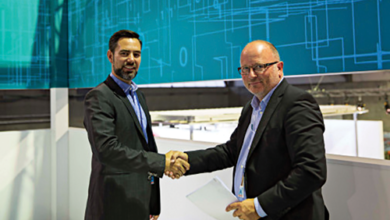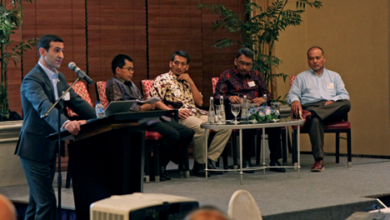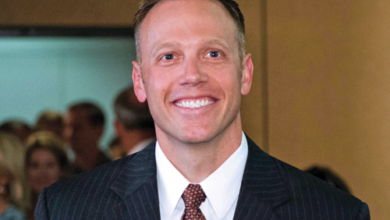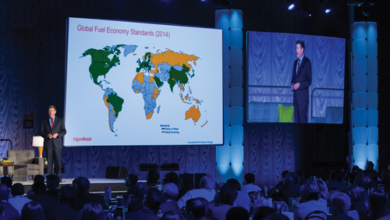Drilling Ahead: Don’t let crisis go to waste: Time for change is now
By Linda Hsieh, Managing Editor
At the IADC/SPE Asia Pacific Drilling Technology Conference (APDT) this year, one panel session was devoted to the question of whether all the various stakeholders in the industry – operators, drilling contractors, service companies and equipment manufacturers – can achieve mutual profitability in turbulent times such as these.
The answer from panelist David Reid, Chief Marketing Officer for National Oilwell Varco, was simply that we must, and we will. “We understand that we must find a way,” Mr Reid said, adding that downturns – while painful – are actually good for the industry. When times are good, companies typically don’t have time for anything but execution and delivery. But when times are bad, it’s time to learn and improve. “It causes us to ask really hard questions,” he said.
So what are some hard questions that companies and leaders should be asking? One that immediately came to my mind was: Has the industry really embraced collaboration in ways that are leading to sustained, structural cost reductions? Costs have fallen over the past couple of years, but have these reductions come from finding truly smarter ways to operate, or have they come from personnel layoffs and “squeezing” service and equipment providers? Because the latter, while effective in the short term, is both unsustainable and insufficient for achieving the levels of cost reduction this industry needs.
In fact, Dalma Energy CEO Dr Fredric Young, who also spoke at APDT, said he firmly believes well costs will have to come down by 70%, especially in the face of increasing competition from alternative energy sources. That kind of cost reduction can only come from wholesale changes in the way we work. Automation, better use of real-time downhole data and digitalized work flows will likely be a part of the solution. Some have also suggested that the traditional procurement model, and perhaps even the entire business model, needs to be changed.
Another question that comes to mind is: Did the industry really learn its lesson about people from what happened in the 1980s and ’90s? How many leaders did we lose to other industries, and how many innovations did we miss out on because engineers and scientists found better careers in medical, aerospace or IT? Estimates vary, but conservatively speaking the industry has cut more than 350,000 jobs over the past couple of years.
Some level of workforce reduction is inevitable when the market fall-off is this steep, but Dr Young urged industry leaders to shift the conversation away from how to “cut fat” from their organizations. “Cutting fat means you fire people who are in the overheads. What a horrible statement,” he said. “A totally different way is, I know for my company that $1 spent in overhead creates $3.6 EBITDA, so I will tell my guys I’m going to spend another $1 to make another $3.6.”
Smart leaders will find ways to generate earnings by investing in competent and talented employees, not cut out the $1 in payroll and the $3.6 in potential earnings with it. “It’s a fail of the system, and we won’t get change if we don’t start talking about the right things,” Dr Young said. “The tone of the conversation needs to change.”
On safety, too, there are hard questions that should be asked: How has the industry improved training and competency since 20 April 2010? Have we done enough to ensure that similar events will never happen again?
Human factors have certainly come to the forefront, particularly around well control training. However, work remains to be done to close the gaps between “work as done” and “work as imagined.” At some companies, “procedure not followed” is simply not accepted as the result of an incident investigation anymore. Why were procedures not followed? Did conditions at the rig site not allow employees to follow procedures? Are the procedures themselves out of date or too complex?
Thomas Burke, President and CEO of Rowan Companies, summed it up well when he spoke at an IADC event recently: “Our safety record will improve when we understand why people do what they do.”
The drilling industry is undoubtedly going through some very hard times, but, as the saying goes: Don’t let a crisis go to waste. The time to ask hard questions and make real changes for the better is now. DC




